


Carl Wilhelm Hermann Nothnagel (28 September 1841 – 7 July 1905) was a German internist born in Alt-Lietzegöricke (Polish : Stare Łysogórki ), near Bärwalde in der Neumark (Polish : Mieszkowice), Neumark, Brandenburg.



Carl Wilhelm Hermann Nothnagel (28 September 1841 – 7 July 1905) was a German internist born in Alt-Lietzegöricke (Polish : Stare Łysogórki ), near Bärwalde in der Neumark (Polish : Mieszkowice), Neumark, Brandenburg.
The son of a pharmacist, from 1858 to 1863 Nothnagel studied under Ludwig Traube (1818–1876) and Rudolf Virchow (1821–1902) at the University of Berlin. From 1865 to 1868 he was an assistant to Ernst Viktor von Leyden (1832–1910) at the University of Königsberg where, in 1866, he was habilitated for internal medicine. From 1868 to 1870 he worked as a military physician and lecturer in Berlin and later served in the same roles at Breslau (1870–72).
In 1872 he relocated to Freiburg and in 1874 was appointed full professor at the medical clinic in Jena. From 1882 until his death in 1905, he was a professor at the university clinic in Vienna. One of his better known students was Constantin von Economo (1876–1931). In 1879 he became a member of the Deutsche Akademie der Naturforscher Leopoldina.
In 1876 he described the irregular pulse associated with atrial fibrillation. At the time he referred to this finding as "delirium cordis". [1] The eponymous "Nothnagel's syndrome" is named after him, a disorder characterized by ipsilateral oculomotor palsy and contralateral cerebellar ataxia. [2]
He died in Vienna. He is interred at the Matzleinsdorf Protestant Cemetery (top middle vault, No. 109). In 1922 medical historian Max Neuburger published his biography with the title "Hermann Nothnagel, Leben und Wirken eines deutschen Klinikers". [3]
In collaboration with other physicians, Nothnagel published "Specielle Pathologie und Therapie", a comprehensive 24-volume handbook of medicine. Prior editions of this work were issued by Rudolf Virchow (from 1854 to 1876) and Hugo Wilhelm von Ziemssen (from 1875 to 1885) as "Handbuch der speciellen Pathologie und Therapie". [4]
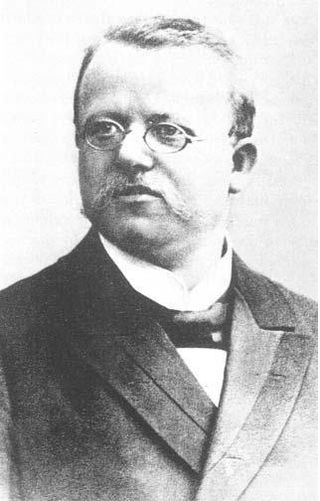
Hermann Oppenheim was one of the leading neurologists in Germany.

Ludwig Lichtheim was a German physician of Jewish descent.
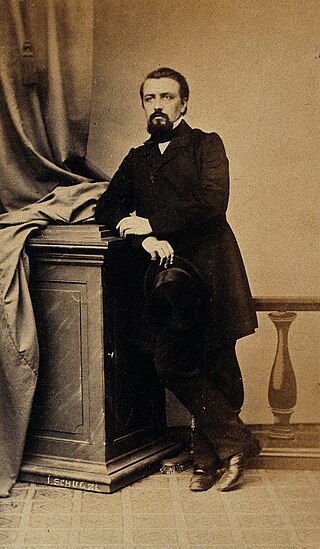
Nikolaus Friedreich was a German pathologist and neurologist, and a third generation physician in the Friedreich family. His father was psychiatrist Johann Baptist Friedreich (1796–1862), and his grandfather was pathologist Nicolaus Anton Friedreich (1761–1836), who is remembered for his early description of idiopathic facial paralysis, which would later be known as Bell's palsy.

Paul Julius Möbius was a German neurologist born in Leipzig. His grandfather was the German mathematician and theoretical astronomer August Ferdinand Möbius (1790–1868).
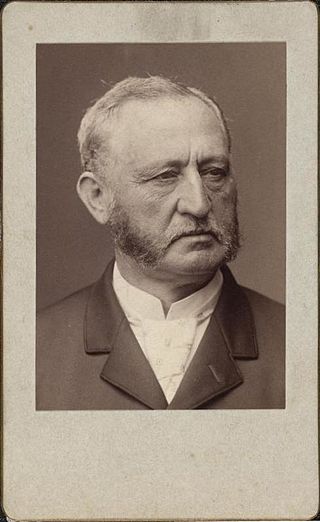
Isidor Neumann, Edler von Heilwart was a dermatologist from the Austro-Hungarian Empire.

Wilhelm Griesinger was a German neurologist and psychiatrist born in Stuttgart.

Hugo (Wilhelm) von Ziemssen was a German physician, born in Greifswald.
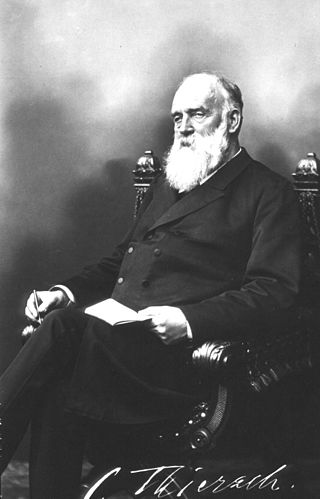
Karl Thiersch, also spelled Carl Thiersch, was a German surgeon born in Munich. His father was educationist Friedrich Thiersch, his father-in-law was renowned chemist Justus von Liebig. One brother, Ludwig, was an influential painter, while another, Heinrich Wilhelm Josias, was a theologian.

Leopold Schrötter Ritter von Kristelli, was an Austrian internist and laryngologist born in Graz. He was the son of chemist Anton Schrötter von Kristelli, and father to physician Hermann Schroetter-Kristelli (1870–1928).

Karl Ludwig Ernst Friedrich Schroeder was a German gynecologist.

Friedrich Schultze was a German neurologist and native of Rathenow, Brandenburg. He is known for being the founder of child neurology.
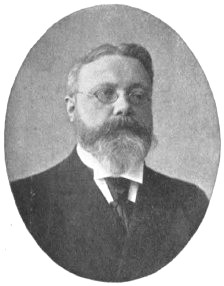
Friedrich Jolly was a German neurologist and psychiatrist who was a native of Heidelberg, and the son of physicist Philipp von Jolly (1809–1884).

Carl von Liebermeister was a German internist who was a native of Ronsdorf.

Wilhelm Olivier Leube was a German internist born in Ulm.
Hermann Senator was a German internist who was a native of Gnesen in the Prussian Province of Posen.

Felix Victor Birch-Hirschfeld was a German pathologist who was a native of Kluvensieck bei Rendsburg.

Gustav Huguenin was a Swiss internist and pathologist who was a native of Krauchthal.
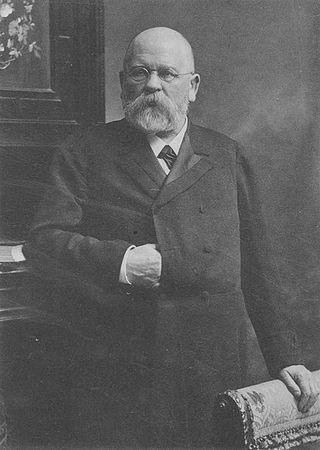
Rudolf Chrobak was an Austrian gynecologist who was a native of Troppau, Austrian Silesia.

Theodor von Jürgensen was a German internist who was a native of Flensburg, Schleswig-Holstein.
Carl Hueter was a German surgeon born in Marburg. He was the son of obstetrician Karl Christoph Hueter (1803–1857).